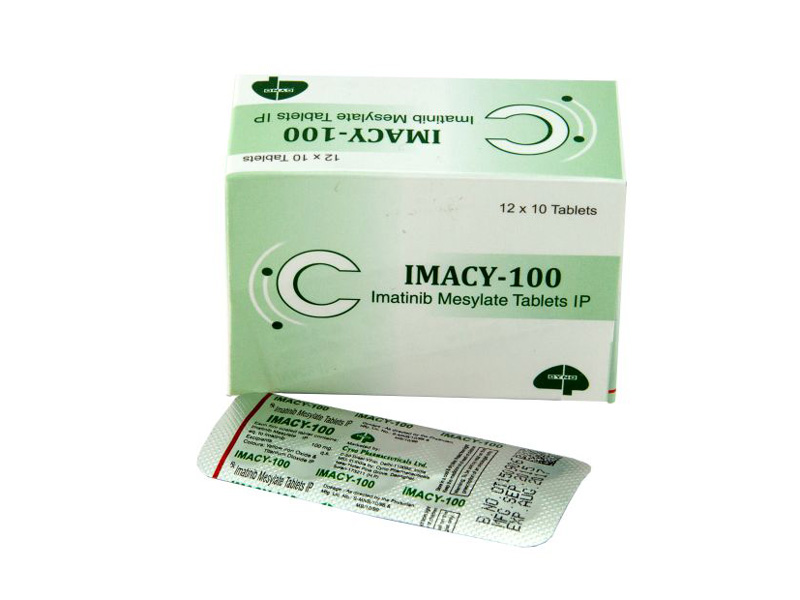IMACY-100mg
Imatinib Mesylate (100 mg)
Tyrosine kinase inhibitors (TKIs) have been approved for cancer treatment and numerous are under investigation. These drugs are rationally designed to target specific tyrosine kinases that are mutated and/or over-expressed in cancer tissues. Ninety-five percent of all chronic myelogenous leukemia (CML) was suggested to be the result of the altered tyrosine kinase that, under physiological conditions, is under tight control but in fusion is deregulated and expressed constitutively resulting in indefinite proliferation.

Mechanism of Action:
Imatinib specifically inhibits Bcr-Abl cell proliferation. It competes with ATP for the ATP binding site of the tyrosine kinases. In in-vitro tests, imatinib inhibits Bcr-Abl, c-Abl, and platelet-derived growth factor receptor (PDGFR) tyrosine kinase.
Imatinib is administered orally and is formulated in hard capsules or tablets as a salt (Imatinib methanesulfonate or mesylate). Each tablet contains 100 or 400 mg of Imatinib free base. The recommended dosage for adult patients with Philadelphia chromosome-positive CML at its various phases (chronic, accelerated, blast crisis) or Kit-positive unresectable and /or metastatic GIST is 400mg or 600mg given once daily with a meal, as a monotherapy. In children with CML, daily doses range from 260mg/m2 to 340mg/m2. The treatment is continued until disease progression or unacceptable toxicity.
Pharmacokinetic Properties:
Absorption:
Imatinib is rapidly absorbed after oral administration with a peak plasma concentration at 2 hrs. The bioavailability of Imatinib is ∼ 98% which is irrespective of oral formulation (solution, capsule or tablet) or dosage (100mg or 400mg).
Distribution:
Imatinib is extensively distributed into tissues and highly protein-bound, predominantly to albumin and α1-glycoprotein (AGP), which is translated into a large volume of distribution of 435 L and a long half-life of 18 hrs. Imatinib only penetrates in the cerebrospinal fluid (CSF) to a limited extent.
Metabolism:
Imatinib is primarily metabolized through CYP3A4 and CYP3A5 with CYP2D6, CYP2C9, CYP2C19 and CYP1A2 playing a minor role. Patients carrying a polymorphism in CYP2D6 (*4 allele) show a reduced apparent clearance indicating that CYP2D6 appears to be important in-vivo in the metabolism of Imatinib. The main metabolite is CGP74588 which represents approximately 10% of the Imatinib AUC and has similar potency in vitro.
Excretion:
Imatinib is mainly eliminated through the liver. The kidneys only excrete a minimal amount of the drug and its metabolites. Of a single dose of Imatinib in healthy volunteers, 81% of the dose was recovered in urine and feces in 7 days.
Drug Drug Interaction:
When Imatinib is co-administered with other medicinal products, there is a potential for drug interactions. Caution should be used when taking Imatinib with protease inhibitors, azole antifungals, certain macrolides, CYP3A4 substrates with a narrow therapeutic window, or warfarin and other coumarin derivatives.
Precaution:
Your doctor must check your progress at regular visits to make sure that this medicine is working properly. Blood tests may be needed to check for unwanted effects. Be sure to keep all appointments.
Using this medicine while you are pregnant can harm your unborn baby. Use a highly effective form of birth control (especially if you are a sexually active female patient) during treatment and for 14 days after your last dose to keep from getting pregnant. If you think you have become pregnant while using the medicine, tell your doctor right away.
Serious skin reactions can occur during treatment with this medicine. Check with your doctor right away if you have blistering, peeling, or loosening of the skin, red skin lesions, severe acne or skin rash, sores or ulcers on the skin, or fever or chills while you are using this medicine.
Some serious side effects such as black-tarry stools, severe stomach pain, or vomiting of blood or material that looks like coffee grounds can occur during treatment with this medicine.
While you are being treated with imatinib, and after you stop treatment with it, do not have any immunizations (vaccinations) without your doctor’s approval. Imatinib may lower your body’s resistance and there is a chance you might get the infection the immunization is meant to prevent. In addition, other persons living in your household should not take the oral polio vaccine since there is a chance they could pass the poliovirus on to you. Also, avoid persons who have recently taken oral polio vaccine. Do not get close to them and do not stay in the same room with them for very long. If you cannot take these precautions, you should consider wearing a protective face mask that covers the nose and mouth.
Breast feeding:
Both Imatinib and its active metabolite can be distributed into human milk.
Fertility:
Patients concerned about their fertility on Imatinib treatment should consult with their physician.
Dosage:
Doses of 400 mg or 600 mg should be administered once daily, whereas a dose of 800 mg should be administered as 400 mg twice a day.
Duration of action:
Approximately 18 h.
Adverse Reactions:
Patients should be advised to tell their doctor if they experience side effects during Imatinib therapy including fever, shortness of breath, blood in their stools, jaundice, sudden weight gain, symptoms of cardiac failure, or if they have a history of cardiac disease or risk factors for cardiac failure.
Storage:
Do not store above 30 degree C.
Store in the original package in order to protect from moisture.
Keep all medications away from children and pets.
Overdose:
Overdose can cause severe muscle cramps.
Contraindications:
Use of Imatinib mesylate is contraindicated in patients with hypersensitivity to Imatinib or to any other component of Imatinib mesylate.
Warnings:
Upset stomach, nausea/vomiting, diarrhea, headache, muscle/joint pain, muscle cramps, dizziness, blurred vision, or drowsiness may occur. If any of these effects last or get worse, tell your doctor or pharmacist promptly.
Pregnancy:
Women of childbearing potential should be advised to avoid becoming pregnant.
